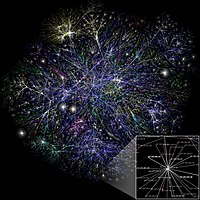
Photo from wikipedia
Network structure has often proven to be important in understanding the decision behavior of individuals or agents in different interdependent situations. Computational studies predict that network structure has a crucial… Click to show full abstract
Network structure has often proven to be important in understanding the decision behavior of individuals or agents in different interdependent situations. Computational studies predict that network structure has a crucial influence on behavior in iterated 2 by 2 asymmetric ‘battle of the sexes’ games. We test such behavioral predictions in an experiment with 240 human subjects. We found that as expected the less ‘random’ the network structure, the better the experimental results are predictable by the computational models. In particular, there is an effect of network clustering on the heterogeneity of convergence behavior in the network. We also found that degree centrality and having an even degree are important predictors of the decision behavior of the subjects in the experiment. We thus find empirical validation of predictions made by computational models in a computerized experiment with human subjects.
Journal Title: Scientific Reports
Year Published: 2019
Link to full text (if available)
Share on Social Media: Sign Up to like & get
recommendations!